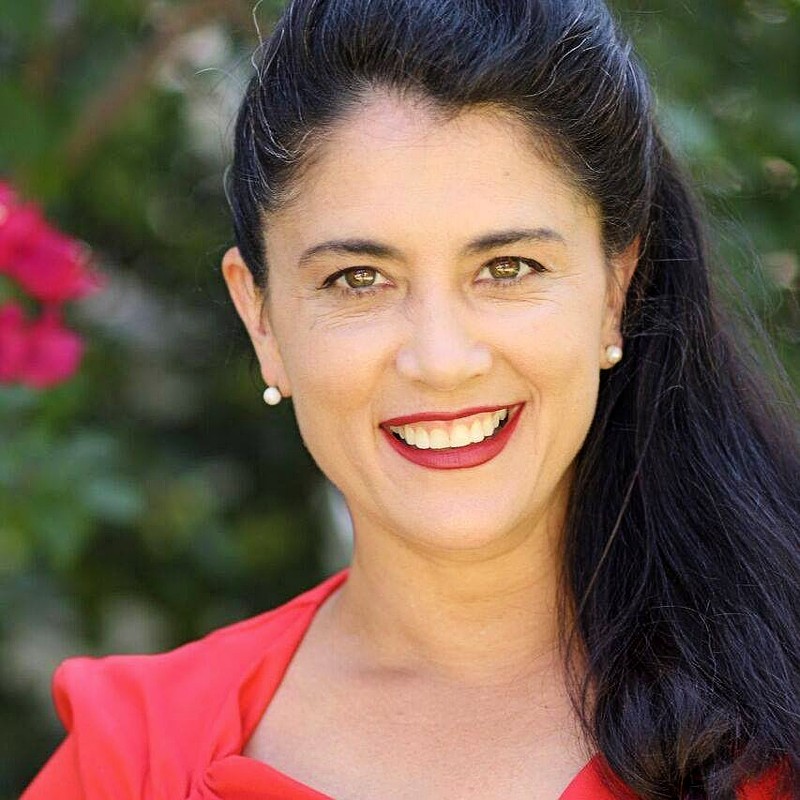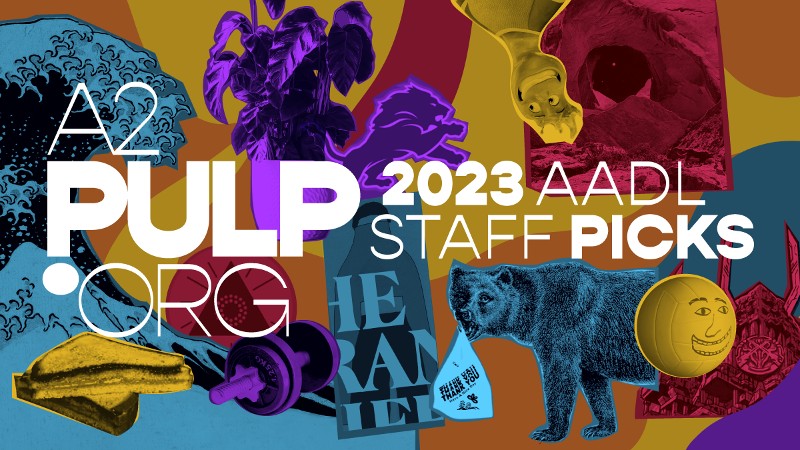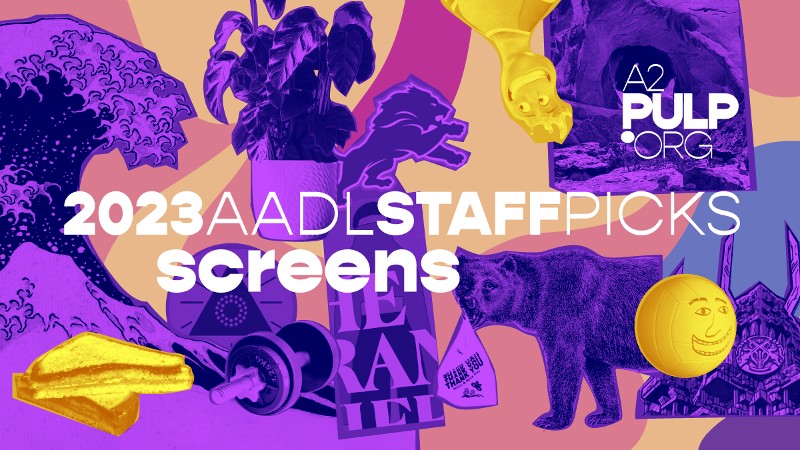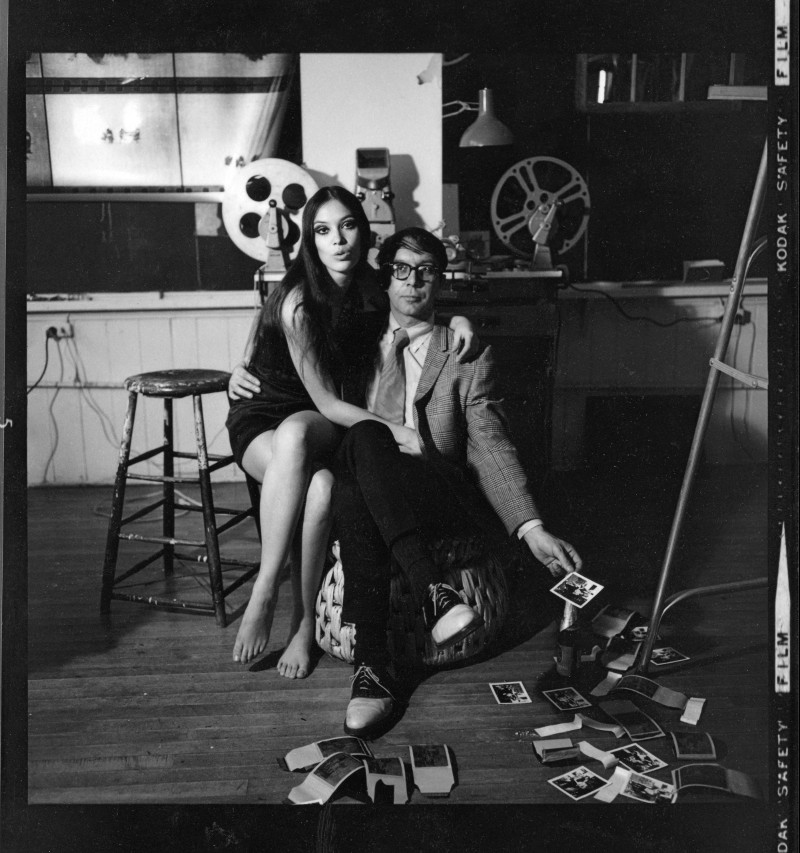Locals Rule: Highlighting the Washtenaw County creatives in the 62nd Ann Arbor Film Festival

The Ann Arbor Film Festival (AAFF) draws experimental filmmakers from across the world, but ever since it began in 1963 it's also made room for local creators to show their works.
The 62nd edition of AAFF is running March 26-31, and the fest's website and YouTube page have a ton of info, interviews, and articles about the hundreds of films that will be screened this year alongside dozens of social events, panels, and exhibitions.
But it's a lot. Like, a lot a lot, which means you would have to comb through a ton of material to figure out the creatives with local connections.
So, being the hyperlocal fans that we are, we did that for you and collected the events, screenings, and installations created by Washtenaw County-associated artists, curators, and film lovers who will have a moment to shine at the 2024 Ann Arbor Film Festival.
The Acting Office: Andrew Otchere turned his University of Michigan studies into the comedy "Becoming BFA: The Showcase Showdown"

Sometimes the most challenging part of a creative project is figuring out the best means of communicating a story to an audience.
In the case of Becoming BFA: The Showcase Showdown, creator Andrew Otchere—who graduated from the University of Michigan last spring with a degree in acting—initially thought he and a handful of student collaborators would be writing a television pilot when they gathered during their junior year.
“Then, as we talked about the concept, one aspect that became most important to me was that I really wanted to create something that would build a stronger community within my class of actors,” said Otchere, who just recently moved to Los Angeles (where he’s auditioning and writing). “I wanted to make sure that everybody was included. … By our senior year, there were about 18 of us … so it became a little too much to just be a pilot episode. There would be too many characters.”
So this would-be pilot episode became a short film that ran nearly 40 minutes.
But that wasn’t the final word on the project’s format, either. As Otchere submitted BFA to film festivals—it landed a screening at the Laughs After Dark Comedy Festival in Las Vegas—he started getting feedback that pointed him in a different direction entirely.
“One of the best pieces of advice I got was about how we are currently in the height of the digital age, where TikTok and short-form video has taken control,” Otchere said. “And being a story that focuses on the Gen Z perspective, which the target audience is also in … it only made sense to make episodes that are shorter, so we could put it out on TikTok, or create a mini web series of it. So that inspired me to cut [the film] up into nine five-minute episodes. And since it took form as a web series, it just felt like it was received so much better. People were excited for new episodes and gave a lot of feedback.”
The seed for making Becoming BFA—which focuses on students preparing for their Senior Showcase, when they get to perform in front of entertainment industry professionals—took root in Otchere’s freshman year (2019-20), when he and his fellow student actors joked about feeling like they were living in a reality show.
Ann Arbor filmmaker Christina Morales Hemenway premieres "Get Real" comedy at the Michigan Theater

Christina Morales Hemenway got the idea for her new film, Tommy Hollywood and Katie Encino Move to the Midwest to Get Real, in 2005, after she moved back to Michigan following 17 years in Los Angeles.
The Ann Arbor-raised Morales Hemenway—her parents own Elmo's T-Shirts on East Liberty Street—found so much humor in the expansive cultural gap between Left Coast glamor and Midwestern modesty that she wrote a script that ends up lovingly skewering both sides. (The ad line for the film is, "Think Clueless meets Fargo. A mutually offensive comedy.")
Now, nearly 20 years after the initial inspiration, the comedy more commonly called Get Real has its premiere at the Michigan Theatre on Friday, January 5—which is only fitting.
"Russ Collins [executive director] of the Michigan Theater plays the mayor of the small Midwestern town [the characters] end up in," Morales Hemenway says. (Her 2005 film, Dreammaker, also premiered at the Michigan Theater.)
Filmed in Milan, Ann Arbor, and Brighton, the fish-out-of-water comedy pokes fun at our celebrity-obsessed culture. Get Real is Morales' fifth feature outing as a writer-director and it shifts the focus from the romance of her last film, 2019's Bride +1, to satire and tells the tale of two disillusioned "L.A. airheads" who move to a small Michigna town in a last-ditch bid to save their relationship. Actors Chris Daftsios and Joni Allen play the lead roles, and a large part of the rest of the cast is Ann Arbor-area actors—most of whom have never acted before.
AADL 2023 STAFF PICKS: HOMEPAGE

People who work at the Ann Arbor District Library love to give recommendations.
Whether in person at one of the five branches, in the News and Reviews section of AADL's website, or right here at Pulp, highlighting our favorite books, films, TV shows, video games, websites, adventures, and more is just part of the gig.
Like you, we are passionate enjoyers of media and experiences.
This is our seventh year compiling Ann Arbor District Library staff picks—and with more than 40,000 words spread out over four posts, it is the longest edition yet.
To reiterate: We. Love. To. Give. Recommendations.
Here are the creative works and experiences we discovered in 2023 that moved us enough to share them with you. (Not that you needed to twist our arms.)
➥ AADL 2023 Staff Picks: Words
➥ AADL 2023 Staff Picks: Screens
➥ AADL 2023 Staff Picks: Audio
➥ AADL 2023 Staff Picks: Pulp Life
AADL 2023 STAFF PICKS: SCREENS

➥ AADL 2023 Staff Picks: Homepage
➥ AADL 2023 Staff Picks: Words
➥ AADL 2023 Staff Picks: Audio
➥ AADL 2023 Staff Picks: Pulp Life
AADL 2023 STAFF PICS: SCREENS
TV, movies, DVDs, video games, YouTube, streaming, etc.
Screen Tests: Experimental shorts by Ann Arbor filmmakers

Like all great things, the Ann Arbor Film Festival rose from humble beginnings.
Founded in 1963 by filmmaker and connoisseur George Manupelli, the festival quickly earned an international reputation as a premier venue for independent and experimental cinema. The Michigan Theater has provided the AAFF with a luxurious home since 1980, but the original home base was the University of Michigan’s Architecture Auditorium (now known as Askwith), and the vibes back then were decidedly scruffier.
Local film historian, projectionist, and author Frank Uhle remembers it well.
“In the early days of the Film Festival, audiences were very interactive,” he explained. “There was always a smell of stale beer, cigarettes, and pot smoke in the air. Inevitably some of the films were boring, or pretentious, or deliberately provocative, and people would yell their opinions at the screen or whistle and make noise.
“Sometimes another person would defend the movie and an argument would ensue. Always, a beer bottle would get tipped over in the dark and roll noisily down the sloped floor while everyone snickered.”
That’s the kind of anarchic spirit Uhle will be conjuring on Friday, December 1 at 7 pm when he hosts “Experimental Shorts by Ann Arbor Filmmakers From the 1960s-80s,” a free screening of vintage celluloid at Askwith Auditorium in Lorch Hall. (It's part of U-M's semester-long "Arts and Resistance" series.)
No, he’s not going to let you smoke in there, but he’ll be showing early homegrown AAFF favorites in the same venue they first flickered in back when the counterculture was the culture and the art was the point.
Uhle went to his first AAFF in 1978 and has been involved in local film culture ever since. His recent book, Cinema Ann Arbor, covers the 100-year history of A2’s campus cinema societies and the filmmakers they inspired and nurtured.
Students first officially organized film clubs in 1932 to screen non-mainstream fare, local interest grew along with the AAFF and the university began its film program in 1968. By the 1970s, there were multiple, competing student film societies outdoing each other with screenings of foreign rarities, forgotten Hollywood masterpieces, and uncompromising experiments. It was inevitable that a devoted scene of filmmakers would bloom in such soil, and it’s these artists that Uhle celebrates, a few of whom he’ll have on hand for a Q and A session after the screening.
The films share a loose, improvisational approach but cover a wide range of styles. Handmade animation, abstract imagery, punk lampoonery, cinema verite slices-of-life, introspective moodiness, anti-war agitprop, plus vintage promos and ephemera from film society screenings of the day. Some haven’t been seen for decades, enjoying only a handful of local screenings after production before languishing in various states of storage.
“I got them from a bunch of different sources,” said Uhle. “Mostly from filmmakers, but some of them were literally found in the attic of the Michigan Theater. A lot of the projectionists from U of M would also moonlight at the Michigan, and at a certain point people were stashing these prints up in the attic.”
Others came from faculty members who had purchased and preserved some of the better films that former students had made.
“I’ve had some strokes of good fortune. Alan Young from the film program has this wonderful office that’s like an archive of old equipment," Uhle said. "I noticed up on a shelf there were a few reels of 16mm film. They were student projects that they saved. Some of these films, my god, they were just amazing-looking films.”
Here are a few highlights:
The Lord of the Screens: U-M professor Daniel Herbert chronicles the history of New Line Cinema in "Maverick Movies"

Late August at Hotel Ozone. Stunts. Get Out Your Handkerchiefs. A Nightmare on Elm Street. Critters. House Party. Teenage Mutant Ninja Turtles. Twin Peaks: Fire Walk with Me. Dumb and Dumber. Austin Powers: International Man of Mystery. Hedwig and the Angry Inch. The Lord of the Rings. The Notebook.
These films all have one thing in common: New Line Cinema.
University of Michigan film and media professor Daniel Herbert chronicles and analyzes the history of the production studio and its films in his new book, Maverick Movies: New Line Cinema and the Transformation of American Film.
Herbert initially launched his interest in New Line by teaching a course on the company. Back in 2010, the idea came from U-M librarian Philip Hallman, who also speculated about a possible book. The class evolved, and Herbert conducted extensive research that culminated in his book. He studied the Robert Shaye-New Line Cinema Papers and the Ira Deutchman Papers, which are in the Screen Arts Mavericks and Makers collection at the Special Collections Research Center of the University of Michigan Library. The closing lines of the book describe the origins of its title:
Sing Us a Song: The piano men and women of "Duelers" star in a new Michigan-produced film with deep local connections

Duelers Piano Bar is the home of five young musicians who trade keyboard licks and share solace, shots, and sounds on a nightly basis. But the venue that offers them a routine and respite from problems is about to be sold by a money-hungry owner, which will turn their lives upside down.
This is the plot of Duelers, a new movie made by a group of multi-talented Michigan creatives. Writer/composer/co-star Drew De Four, producer / cinematographer Danny Mooney, and their cast of real-life performers straddle the line between a concert film and backstage drama. The film was shot at the now-closed J.D.'s Key Club piano bar in Pontiac, Michigan, taking 12 days over two weeks.
Like his co-stars, De Four is a real dueling pianist, and his talents have taken him around the globe. During shooting, he lived with the actors who play Tyler (Tom McGovern), Jane (Elisa Carlson), Skip (Danny Korzelius), and Bethany (Shelby Winfrey), the multi-talented musicians who share the stage nightly with Drew (De Four) at the fictional Duelers Piano Bar.
De Four, 40, has been playing in piano bars since he was 19. He was a student at Eastern Michigan University when he saw an ad for Pub 13, a dueling pianos bar in Ypsilanti.
"I took five years of piano lessons from ages 7 to 12," De Four says. "From 12 to 18, I taught myself piano, guitar, bass, mandolin—a little bit of drums. When I was 19 I went to Eastern for a year to study piano, and my professor told me I should not be studying classical piano because when I came back from the piano bars asking, 'How do I do stride piano?' He said, 'You could teach me. You seem to know exactly what you want to do. We're studying Rachmaninoff and Liszt: That's not what you're meant for.'"
Panel Discussion: "Cinema Guild and Campus Film Societies: Their History and Legacy"
March's 61st Ann Arbor Film Festival (AAFF) was also the soft launch of Frank Uhle's new book, Cinema Ann Arbor, which officially comes out in June.
Uhle hosted a panel at AAFF, "Cinema Guild and Campus Film Societies: Their History and Legacy," a topic covered in the book, documenting the groups who brought cutting-edge films to the University of Michigan—and the controversies that sometimes ensued.
We interviewed Uhle about the film societies in a preview article for this panel discussion—check it out here—which included former U-M film society members Hugh Cohen, Dave DeVarti, Philip Hallman, and Anne Moray.
You can now view the panel discussion in the video above.
No Restrictions: Independent Film Festival Ypsilanti returns with a full slate

When Martin Thoburn and Donald Harrison launched the Independent Film Festival Ypsilanti (iFFY) in 2020, they offered cinema fans socially distanced, drive-in-style screenings and a momentary reprieve from the pandemic, which had shuttered movie theaters across the country.
Three years later—and one year after finding a new home at the Riverside Arts Center—iFFY is solidifying its spot on the local film scene with an ambitious scope and schedule, running April 19-23.
"There's also double the amount of programming. An extra day-and-a-half," said Micah Vanderhoof, iFFY operations manager and a University of Michigan alum with a bachelor's degree in screen arts and cultures who previously worked as a programmer for the Portland International Film Festival.
"Michigan-ish," a competitive program of a dozen short films produced in and around the region, kicks off the fest on Wednesday, April 19 at 7:30 pm, followed by an after-party at Ziggy's featuring DJ sets and decorations by House of Jealous Lovers.


































